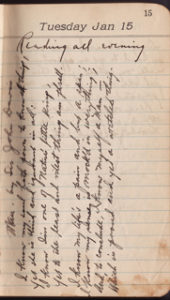 Light
Light
A Poem by
Francis William Bourdillon
———————–
The night has a thousand eyes,
And the day but one;
Yet the light of the bright world dies
with the dying sun.
The mind has a thousand eyes
And the heart but one;
Yet the light of a whole life dies
When love is done.
—————-
Matt’s Notes
Papa has clearly not shaken the wistful, reflective mood triggered by his Hebrew birthday and the arrival of his niece’s wedding photo on the previous day. You need only read this poem a couple of times to understand his mood.
————
Call for research help
It’s about to get harder for me to spend as much time as I’d like on research for this project. That’s why I’m asking you, my legions of readers — and make no mistake, your numbers are so vast that to keep count takes almost all of my fingers — for help.
I’ve posted a page on this site called “Cry For Help” with a list of the many people, places, organizations, musical references, events and details of New York life that appear in Papa’s diary. If you know about or are interested in any of these subjects, please write to me at papasdiary ‘at’ gmail.com or post comments about them. If you’d really like to dig in to a subject that might require ongoing research or collaboration, let me know and I’ll set up a collaborative document for us to work on.
I’ve added the list of subjects below, but it’ll always be available on the “Cry For Help” page of this site.
Note: If you want to delve into anything under a “some information already collected” heading, please let me know and I’ll share with you what I’ve got.
——————————–
Organizations:
Total mysteries:
- David Wolpohn Club
- Downtown Zionist Club
- Holland Belgium Club
- Jewish Students Club
- Judea Insurance Company
- Kessler Zion Club
- Kinereth Camp (probably a B’nai Zion camp in Borough Park)
Some information already collected:
- B’nai Zion (a.k.a. Order Sons of Zion)
- Bar Kochba camp of B’nai Zion
- Hebrew Free Loan Society
- Keren Hayesod
- Montefiore Home (later hospital)
- Tikwaith Yehuda club
- Zionist Organization of America
- Information or artifacts and photos relating to Jewish fraternal organizations in general
People (many names are incomplete in the diary, but most of these people would be affiliated with B’nai Zion, Keren Hayesod or the Zionist Organization of America):
Total mysteries:
- “Rabbi Cook”
- “Mr. Graf”
- Rabbi David Horowitz
- Leibel Krebs (described as “a legendary figure from the old country”)
- “Dr. Schecter”
- “Dr. Thon”
- And a ZOA organizer mysteriously named “Blitz”
Some information already collected:
- Joseph Bluestone
- David Blaustien
- Abraham Goldberg
- Arthur Ruppin
- “Judge Strahl”
- Maurice Samuel
- “Mr. Zeldin”
President Calvin Coolidge
- Relationships with Zionism and labor
- February 12 speech on radio
- February 22 speech on radio
- Radio announcement of reelection on November 4
Places
Total mysteries:
- Boisy (?) Hotel
- Café Royal
- Malick’s Restaurant
- Regina Mansion
- Snyatyn Synagogue
- Spring Valley, New York — Jewish summer colonies or other Jewish presence
Some information already collected:
Movies and Movie Theaters
Total mysteries:
- Academy of Music
- “Song of Love”
- “White Sister”
- Lists of releases playing in New York for each month of 1924
Some information already collected:
- Capitol Theatre
- Clinton Theatre
- “Woman of Paris”
Sports
Some information already collected:
- Abe Goldstein (a professional boxer; won a title fight in 1924)
- 1924 New York Yankees
- 1924 New York Giants
- 1924 Brooklyn Robins (a.k.a. “Dodgers”)
Leisure
General and specific information needed:
- Central Park in the 20’s, esp. scenes of people rowing
- Coney Island of the 20’s (overall experience, transportation, summer rental lockers)
Music (history, clips, general background, 1924 prevailing opinion, reviews or performances and recordings):
- “Drigo’s Serendade”
- Eastern European Folk tunes that would have been played in immigrant-oriented Radio in 1924
- Gypsy String Orchestra (particularly their radio presence in the 1920’s)
- “Gypsy Chardash”
- “Indian Love Lyrics” (?)
- Kessler’s Theater
- “Kreuzer Sonata” (at Kessler’s theater on 10/9/24)
- “Rubenstein’s Romance”
- “Shubert’s Waltz op 64#2”
- “Sleeping Beauty
- “Straus’s Waltz, Artist’s Dream”
- “Tosca”
Opera (history, clips, general background, 1924 prevailing opinion, reviews or performances and recordings):
- “Cavalleria rusticana” (March 8th Performance)
- “Carmen” (December 4th performance at the Met)
- “Le Roi de Lahore” (March 26th at the Met)
- L’Cock D’or (heard on radio march 30)
- L’Oracolo” (heard on radio march 30)
- Madame Butterfly” (November 22nd performance)
- “Martha” (December 5th performance)
- “Mefistofele” (with Chaliapin, November 24 performance)
- “Pagliacci (March 8th Performance)
- “Tannhauser” (November 5th at the Met)
- General History of the Met, the New York Opera scene, and what the Opera experience would have been like for cash-strapped immigrants
Radio events and history:
- 1924 Democratic convention coverage radio coverage
- November 4 Election returns coverage
- November 5 Coolidge reelection announcement
- 1924 Democratic convention coverage, esp. June 26, June 30, July 8
- April 14 Daughters of the American Revolution ceremony
- Radio Station WEAF
- WNYC history esp. early broadcasts in July and August
Lifestyle:
- Cars (Photos and information regarding cars available to immigrants in the 1920’s)
- Writing instruments (Photos of pens and pencils used in the 1920’s)
- Telephones (usage and technology in 1924, images of private phones in 1920’s)
- Public transportation (trolley and subway history, maps, fare information, usage in 1920’s)
 Reading all evening
Reading all evening Light
Light
